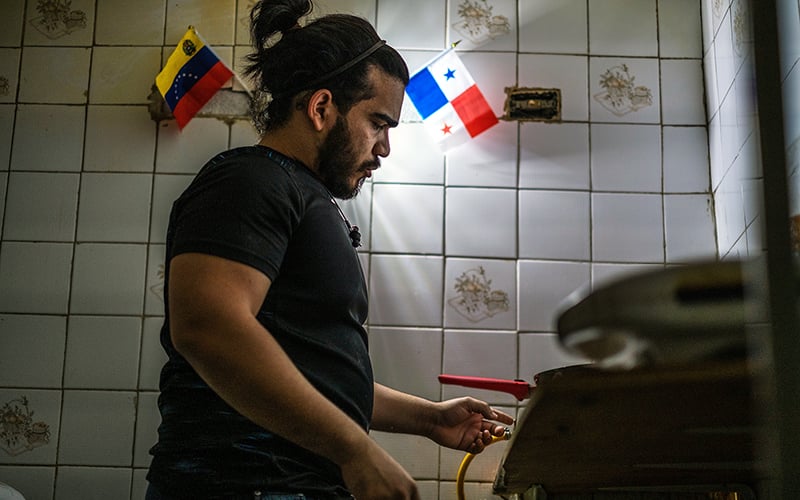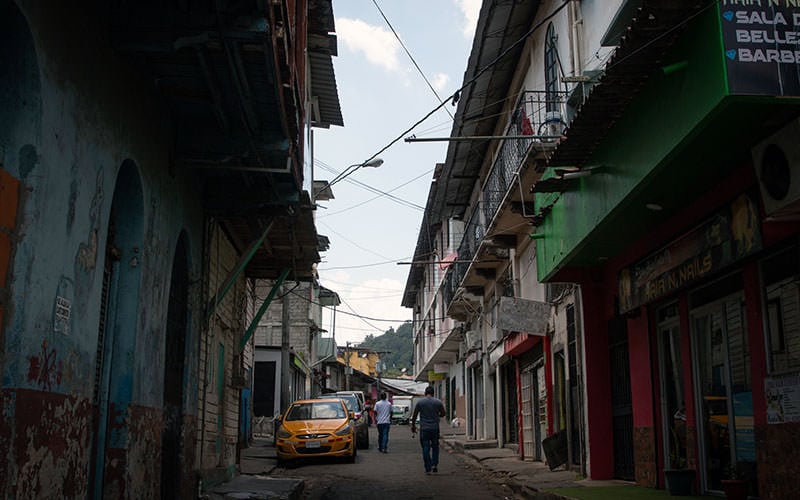
Panama City’s “Old City” neighborhood is blocks from the waterfront’s buzzing rooftop bars and high-end restaurants. In 2018, the Ministry of Social Development found nearly one in five Panamanians live in poverty. (Photo by Katherine Sypher/Cronkite Borderlands Project)
PANAMA CITY, Panama – It’s just before 9 a.m. when a client rings a buzzer outside the law office of Myrna Lopez Yuras in Panama City. As a recent immigrant from Venezuela, the client does not have permission to work in Panama. On this mid-March morning, she hopes to change that.
“If you don’t (work), you will die of hunger,” said the client, whose name Cronkite Borderlands Project is withholding because of her concerns about potential legal repercussions. “You have to have the permits. If you don’t have the permits, it’s very difficult to carry out a dignified life.”
But getting a work permit isn’t always easy. Even if migrants get one, they may not be able to practice their trained professions. To protect job opportunities for Panamanians, the government restricts the types of jobs foreigners can hold and reserves 56 professions only for Panamanian-born or naturalized citizens, including professors, teachers, doctors, nurses, dentists, social workers, architects, accountants, pharmacists and law enforcement officers.
This, on top of a long and expensive work-permit process, a crowded job market and the persistent xenophobia some migrants experience in the country, means some immigrants struggle to find legal work.
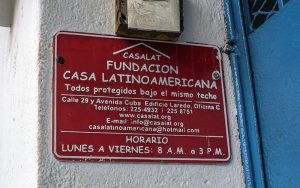
The motto on a sign outside CASALAT, a law office that helps low-income immigrants obtain work permits, translates as “All protected under the same roof.” (Photo by Chloe Jones/Cronkite Borderlands Project)
When the client, a Venezuelan woman in her 60s, arrived in Panama, she faced two problems many migrants confront. First, she had to become a legal resident. Second, she needed to get a job.
She said she taught at the university level in her home country, and she practiced as a therapist of traditional Chinese medicine – but she can’t hold either job in Panama. Without Panamanian citizenship, she can’t teach, and without a work permit, she can’t practice as a therapist.
Wendy Mow, a representative from HIAS, a nonprofit that provides legal and humanitarian aid to refugees in Panama, said being restricted from practicing in their professions in Panama is stressful for migrants and refugees.
“They have been studying for five years, six years, to be a lawyer, to be a doctor, and then they have to flee to another country. And in the other country, they cannot work (in that profession),” she said. “So they have to find another way.”
Instead, immigrants choose unrestricted jobs outside their trained professions, such as a restaurant worker or a delivery driver. But first, they must obtain a work permit.
Getting a work permit is costly and time consuming. Those who have gone through the process say it can take months to finalize.
According to statistics from Panama’s Ministry of Labor and Labor Development (known as MITRADEL), the number of work permits the ministry has approved for foreigners has increased since 2017. That year, MITRADEL approved nearly 24,000 work permits for foreigners, and in 2019, that number increased to nearly 35,000. Despite this, migrants say the process still puts them at a disadvantage as they wait for permission to work.
The COVID-19 pandemic has exacerbated the challenges. In March, as Panama battled the coronavirus pandemic by issuing a nationwide 24-hour curfew, banning international flights and opening a hospital solely for COVID-19 patients, MITRADEL stopped issuing work permits to foreigners altogether.
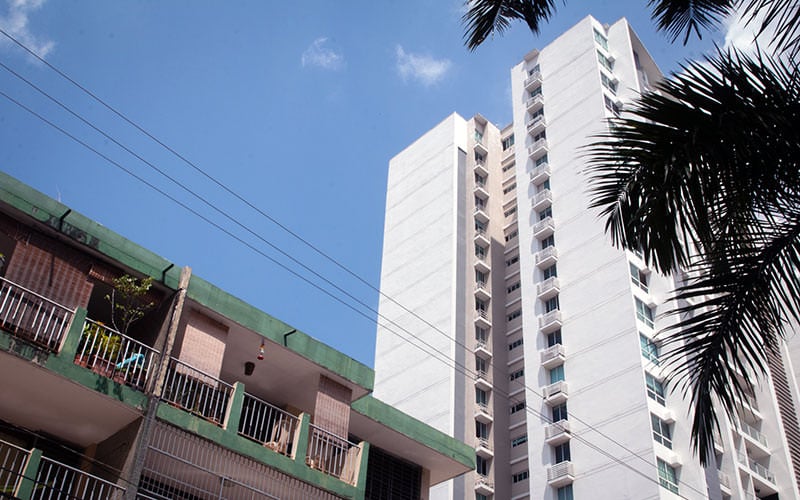
In Panama, a place of economic contrasts, the unemployment rate rose to 7.1% in 2019 – the same year the International Monetary Fund reported the country had seen the highest economic growth rate of any country in Latin America in the preceding 25 years. (Photo by Katherine Sypher/Cronkite Borderlands Project)
The prices vary depending on which of the 22 types of permit a person chooses. A work permit for refugees costs as little as $10, but Panama grants few refugee application requests – according to the United Nations High Commissioner for Refugees in Panama, only 86 people were granted refugee status in 2018, while nearly 16,000 requests for refugee status are currently backlogged. In contrast, migrants seeking residency in Panama for humanitarian reasons pay $250 for a work permit. For some, this cost is prohibitively high.
Instead, many migrants work illegally or accept a job for which they’re overqualified. Others struggle to find jobs and return to their home countries discouraged. If a company hires a migrant without the proper work permit, it risks incurring heavy fines, and the migrants face possible deportation.
“This is the biggest challenge right now in Panama,” said Mow of HIAS. “Every day, we receive people in the office (who say), ‘I need to work. I don’t have papers, what (can) I do?'”
Economic opportunity in Panama is not shared equally by everyone: It is a country of economic contradictions. In 2019, unemployment rose to 7.1%, despite the country experiencing what an International Monetary Fund official called an “economic quantum leap.” According to IMF data, Panama has seen the highest economic growth rate of any Latin American country in the past 25 years.
As a result, people from across Latin America and the world gravitate toward Panama to share in Panama’s growing prosperity. But experts point out that a person’s desire to move to another country does not necessarily guarantee their right to live or work there.
“Everybody, regardless of your status, has rights as a human being,” said William Spindler, a spokesperson with the UNHCR in Panama. “But there is no automatic right of anybody to go and live and work in a country of their choice.”
And so, while new arrivals to Panama make their case that they should be allowed to live and work in the country, they often are left in a state of limbo, unable to legally earn a living.
A 2018 report from Panama’s Ministry of Social Development found that nearly one in five Panamanians live in poverty. Though investments in infrastructure have lifted some people out of poverty in recent years, that number is still worse for people living in rural or indigenous areas.
The number of people in Panama who are unemployed or who work informally – in jobs not monitored or taxed by the government – increased by 5.4% from 2018 to 2019 to over 700,000 informal workers. At the same time, aid organizations say migration to Panama is also increasing, particularly from Venezuela, which has seen 4.5 million residents flee economic and political turmoil over the past five years. They come to Panama in the hope they will be among those who benefit from the country’s growing economy.
The client waiting outside Myrna Lopez Yuras’s office is one of those people.
Once buzzed into the building, she walks up a flight of tiled stairs and pushes another buzzer on the wall beside the office door. The door swings open with an audible click, revealing a cramped room where an air conditioner hums and two workers tap quietly on computer keyboards. A picture window looks out onto the street and an empty dirt lot, and in the distance, glass and steel skyscrapers dominate the city skyline. Framed diplomas and law association memberships cover the back wall, all belonging to Yuras.
By 10 a.m., the office is quietly bustling, a steady stream of people filing in and out. It is here that Yuras, 70, has helped migrants get the work permits they need. She isn’t sure how many people she’s helped obtain work permits over the years – she says she’s been too busy to keep track.
In addition to serving private clients like the woman from Venezuela, Yuras serves on the legal staff of CASALAT, a charitable foundation that helps migrants apply for work permits, the certification necessary for those who want to work legally in the country. CASALAT’s motto: Todos protegidos bajo el mismo techo – All protected under the same roof.
Roger Vergara is a client of Yuras’s at CASALAT. He moved to Panama 10 years ago from Colombia. Now a Panamanian citizen, he returned to the CASALAT office to renew his work permit one last time. New Panamanian citizens have to renew their work permit for the first five years of their citizenship.
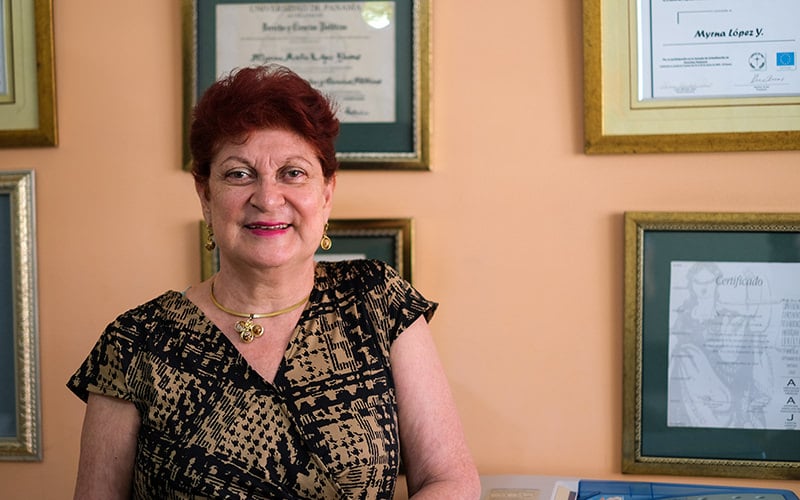
Attorney Myrna Lopez Yuras has helped migrants from countries all over the world get permission to work in Panama. “All cases are different,” she says. (Photo by Chloe Jones/Cronkite Borderlands Project)
Although he called the process long and expensive, Vergara is happy with his job at a Panama City restaurant. In Colombia, Vergara worked as an adviser at an internet media company, but his restaurant job earns more money. An expectant father, he’s happy that he can provide for his daughter when she’s born.
“Thank God I have done well here. I think I have the economic support to prepare a good quality of life for her,” Vergara said.
Yuras said she has helped migrants from countries all over Latin America and the world get permission to work in Panama; many come from Colombia, Venezuela and Nicaragua, with fewer hailing from Jamaica, Chile, Ecuador and the Dominican Republic.
“All cases are different,” Yuras said, adding there is a type of work permit for nearly two dozen scenarios. There’s “(a type) if you have a house, a type if you have a bakery, a type if your mom is Panamanian,” she said, and the list goes on.
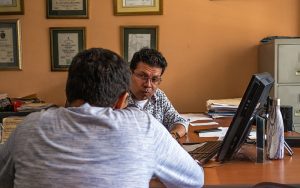
CASALAT employee Erick Del Rosono, right, helps Roger Vergara renew his work permit. Vergara moved to Panama 10 years ago from Colombia. Now a Panamanian citizen, he returned to the CASALAT office to renew his work permit one last time. (Photo by Chloe Jones/Cronkite Borderlands Project)
Yuras said the process of getting a work permit is expensive because migrants not only need to hire a lawyer to help them through the complicated process, they must pay for the cost of the permit itself. That’s why, at CASALAT, Yuras said migrants who cannot pay the lawyer’s fee can leave a voluntary donation instead. Her private clients pay a fee of $600.
The cost of getting a work permit is a problem for everyone who tries to resettle in Panama, including refugees, people forced to leave their home countries to flee war, persecution or natural disaster.
Mow said that even when refugees have all their residency paperwork in order, it takes time to receive their work permit.
“They have to wait one month or two months to have the paper in hand,” she said. “And the issue here is that while this is happening … the person has to eat, the person has to feed their children as well.”
Angel Ortega knows this struggle well. He fled Venezuela to apply for refugee status in Panama with his wife and five young children. If his application were to be accepted, he would be part of an exclusive group. According to officials at the Norwegian Refugee Council, a humanitarian organization that assists refugees, only about 2,500 people have received refugee status in Panama since 1999.
Refugees, migrants and advocacy groups agree that Panama, long known as a “transit country” that migrants would pass through on the way to more desirable ones, has now become a destination country. Ortega and his family were forced to flee Venezuela because of shortages of food and basic supplies and political persecution. They sold everything they had – their kitchen supplies, their bed, their clothes, even their children’s toys – to buy him a plane ticket to Panama, the only ticket they could afford.
In Venezuela, Ortega worked as the director of human resources at Italcambio, a currency exchange company. In Panama, desperate to raise the money he needed to bring his family from Venezuela to join him, he took any job he could so he could purchase plane tickets for his family, his youngest child less than a year old.
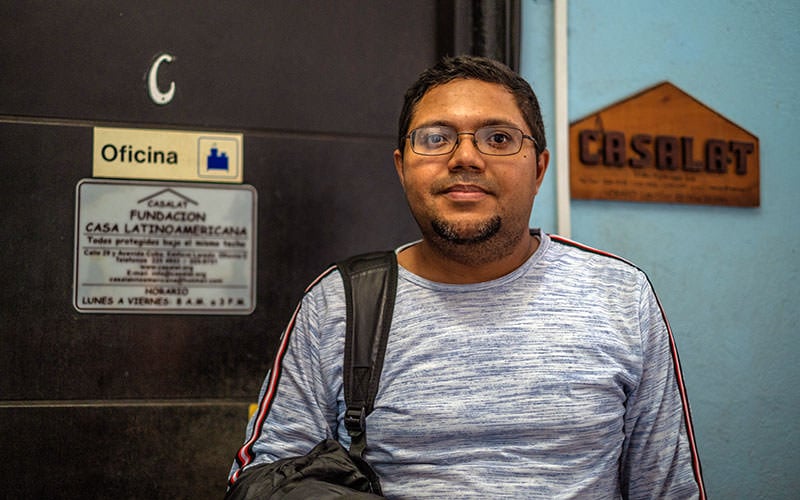
Roger Vergara outside the CASALAT office in Panama City. In Colombia, Vergara worked at a commercial internet media company. In Panama, his restaurant job makes more money. (Photo by Chloe Jones/Cronkite Borderlands Project)
“Eight months later, I could, here in Panama, (do) odd jobs – washing cars, cutting bushes, cleaning windows, people giving me this or that odd job, right?” Ortega said. “I was able, little by little to save enough money to bring my wife and children here.”
According to the Office of the Comptroller General in Panama, 45 out of every 100 people in Panama held an informal job not in agriculture in 2019. Many refugees and other immigrants without proper documentation are among them. This is a troubling trend, according to Mow of HIAS, because it puts both the refugees and the employers at risk. Companies and refugees are fined for working while undocumented and in recent months, MITRADEL has performed multiple raid operations to find migrants working without proper permits.
Working informally, in addition to being risky, isn’t lucrative. Ortega said he struggles to care for his family of seven on the meager wages he brings home each day, sometimes as little as $30 for a full day’s work. As a former professional, Ortega wants to work in a job like the one he held in Venezuela, but he said the process of getting legal status and a work permit in Panama has made that dream difficult to achieve.
“(The refugee office has) not given us an answer to our application for refugee status, and it has been three years since we submitted it,” he said. “We don’t have residency – what we have is an application for refugee status. And as applicants, we cannot get a work permit. And without a work permit, it is impossible to work in Panama.”
Applicants for refugee status, such as Ortega, are not eligible for a work permit until their status as a refugee is officially recognized by the government. Applicants for refugee status who have been formally admitted to the process, but have not yet obtained full refugee status, are eligible for a work permit, thanks to a new executive decree in 2019.
Ortega said he thought the refugee process would be much quicker – six months at most – and he and his family would have been able to live “a normal life” sooner. Three years later, Ortega said he and his family are still waiting, struggling to live the life they hoped and worked for.
“This (dream) is what we aspired to, even being refugees,” he said. “Because the condition of being a refugee should not limit any human being’s right to live in a normal social condition – without problems.”
On top of bureaucratic difficulties, foreigners in Panama also face cultural differences that put them at a disadvantage. Venezuelan migrants are particularly subject to xenophobia.
As the economic situation in Venezuela has worsened over the previous decade, Venezuelans began leaving in large numbers, searching for new homes in other countries. However, they are not always welcomed with open arms. Ortega said being Venezuelan has made it more difficult for him to find a job.
“There is a social pressure that makes the people – the Panamanian business owner – feel like the workforce should be Panamanian, even when there are many jobs that foreigners could fill – or refugees, of whatever country, including Venezuela,” Ortega said. “This social pressure makes the people, the government, and the Panamanian business owner – if they do offer in some cases work to foreigners, they pay them less to justify the fact that they have a foreign workforce.”
The Venezuelan woman in her 60s has experienced the negative impact of that social pressure, too.
“For some reason, people in Latin America say ‘go back to your country,'” she said. The sentiment has a rallying cry familiar to many foreigners in Panama, lended strength by local politicians who repeat it. Panamá para los panameños: Panama for Panamanians.
Living in Panama with her daughter was not the outcome the woman always desired – if she could, she said she would return to Venezuela. She loves her home country. In the end, she said she is just trying to make a better life for herself and her family.
“Venezuelans who have migrated have done it not because they want to,” she said. “It’s because they see it as a necessity to do.”
This necessity – the necessity to work, to care for families, and to live a comfortable life – has drawn other migrants to Panama as well.
Some groups have proposed changes to Panama’s laws regarding foreign workers. The Chamber of Commerce, Industries and Agriculture of Panama has recommended eliminating the mandate that says foreigners cannot work in certain professions. They argue the change will attract foreign talent to Panama, boost the economy and lower the unemployment rate.
This would be good news for many migrants who want to work in their trained professions. In 2019, other changes were made to Panama’s work permit regulations – MITRADEL extended the time period many work permits are valid from one year to two.
Despite these changes, some still feel left behind, even as they try to make their new country feel like home.
“We really have adapted fairly well to life in Panama. It seems like a beautiful country, a country that is quite livable as long as you have the economic resources to live here,” Ortega said. “The bad part for us is that we have not had the economic resources necessary to sustain ourselves well here in Panama.”
EDITOR’S NOTE: This story has been modified from an earlier version to protect the identity of sources who say they could face legal and financial harm if identified.
Cronkite Borderlands Project is a multimedia reporting program in which students cover human rights, immigration and border issues in the U.S. and abroad in both English and Spanish.
